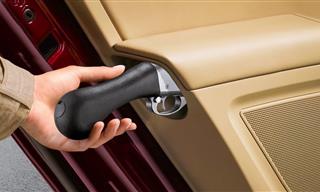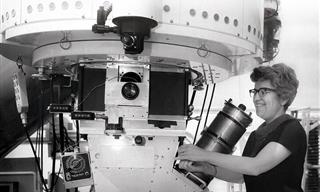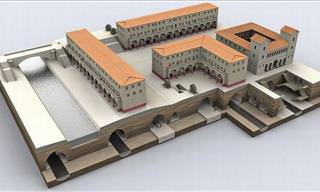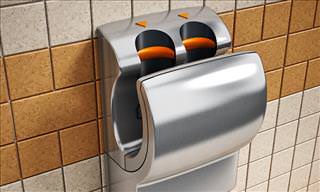
The startup assault on neighborhood stores continues to intensify. First there was Bodega, the terribly named, and most misguided startup with its aim to bring the non-perishable necessities available in corner stores to the masses.
Now, there’s Robomart, which wants to bring groceries, baked goods, and prepared supermarket foods straight to your door. A ten-year vision from founder Ali Ahmed, Robomart is an autonomous grocery store department on wheels.

Robomart is the serial entrepreneur’s latest idea. Ahmed, who first thought of the rolling grocery store concept while working at Unilever 10 years ago, went on to found Lutebox, which was based around the social sharing of media content.
From Lutebox, Ahmed moved on to the now-defunct Dispatch – a service where users could get almost anything they wanted for a fee. At the height of its powers, Dispatch had 1,500 deliverers and they were receiving most orders from people who wanted their groceries delivered.
After investors bought Ahmed out of Dispatch, he moved to Santa Clara, California. To start working on Robomart.
Ahmed says that, “I believe we’re creating a new category. We think we’re competing with the sidewalk robots. However, he is really competing with the corner store – which offers the same goods with the argument of proximity and convenience.
Just like sidewalk robots are being met with some friction in California, Robomart is also expecting some tough times. Traffic and parking are probably going to be some of their biggest problems.
While Ahmed argues that his autonomous delivery vehicles could be purchased by a collective of local stores to compete with the big box retailers, the likelihood is that it will be these big companies that will buy them.
Customers would license the platform and vehicle on a 24-month lease. Ahmed says that “it’s significantly cheaper than setting up a new store, and customers can shop for goods without pre-ordering.”

The interiors of these vehicles come equipped with either a heating or refrigeration system, and Ahmed has talked to wholesalers about equipping the trucks so that they mimic certain area of a grocery aisle – from dairy to meat, to vegetables.
The company is in the process of building prototypes through partnerships with Corbin, the developer of a prototype electric vehicle in 1996, and Hevo Power – a wireless charging startup for electric vehicles which has yet to deliver a product to market.
These are not partners that instill the most confidence in the operation’s success, but Ahmed claims that he’s in discussions with food wholesalers and big-box retailers about the development of these vehicles for the road.
When they are finally rolled out, Ahmed says that they will be completely autonomous. The company aims to license the technology to grocery stores – providing them with the Robomart vehicle, a wireless charger, and an autonomous fleet management and on-demand ordering system designed by Robomart’s team of three engineers.
Source: techcrunch

With These Apps, You Get Unlimited Calls With Wi-Fi
Check out these great apps that will help you make free calls with Wi-Fi.

These People Should NEVER Be Trusted With Technology
These absurd technology fails will make you howl with laughter!

The Future of Dining: Exploring Food Delivery Apps
People have repeatedly raved about food delivery apps due to the holding power and choice they have to offer. In this article we explore why that is.
 19:24
19:24
15 Cool Futuristic Phones That Look Too Good to Be Real
Take a look at some insane smartphone designs that are likely to dominate the world in the near future.

This Futuristic Technology Could Change Lives Forever
Based on recent advancements in technology, here are 5 innovations the really could help shape the future.
 39:01
39:01
What's so Exciting About James Webb Space Telescope?
Why the new James Webb space telescope is much, much better than Hubble.
 5:03
5:03
WHY is Sugar So Devilishy Addictive?
There seems to be a fascinating scientific explanation for why our will power is weak when it comes to sugar!

Scientists Develop 'Flying Dragon' Robot to Fight Fires
Scientists in Japan have created a water-spitting 'flying dragon' robot to fight fires.

These Photos Show How Dependent We are On Smartphones
Technology has taken over and these funny (but true) photos help to drive this fact home.

2023 in Science: Biggest Discoveries You Missed!
Let’s take a look at the most amazing scientific discoveries that made news this year.
 5:08
5:08
Erecting a Behemoth: Installation of an Offshore Oilrig
How do they install an offshore oilrig? This video will show you, step by step, how it is done.
 27:48
27:48
Fascinating: How are CPU Chips Made?
This is a comprehensive look at both the fabrication process and the workings of a microchip plant that makes CPUs for computers.
 5:48
5:48
3 Surefire Ways to Always Identify Pseudoscience
Find out how you can identify pseudoscience, and learn how it differs from actual science.

Nobody Believed These 5 Scientists, But They Were Right
These 5 scientists were shamed and ousted, or rudely ignored, although years later, their "crazy" theories turned out to be true...
 12:35
12:35
The World's Most Dangerous Blood Type
Today we will discuss the most dangerous blood type to have, the one you cannot get an infusion for. Let's delve right in and learn about this rare blood type.

Incredible New Bionic Arm Fuses With Woman's Nerves
Karin's bionic hand is real sci fi, making her one of the first true cyborgs.

20 Useful Facts About the Science of Cooking
The science behind cooking is not often thought of, but it plays a crucial role in a dish turning out right. Here are 20 facts on the science of cooking.
 13:01
13:01
Understanding the Aging Process of Our Body Parts
Find out how every organ and body part in our body changes with age.

GUIDE: How Alcohol Affects Us, Drink by Drink...
In this article, we're going to discuss the exact amounts of alcohol in our blood and what they look like, including how each level affects us and our ability to function.

These 18 Photos Capture the Universe Like Never Before!
See the universe in a new light with these astonishing photos.

PayPal Versus Credit Cards: Here's the Lowdown!
Just how safe is PayPal? Should you have a PayPal account or should you pay for all online purchases using a credit card? All is revealed here!

The Facts You Didn't Know About the Human Body...
Discover 120 fascinating and surprising facts about your body you may not have known. Going over most of the body parts, you will learn so much you never knew about the body we all use.

Battle of the Sexes: How Our Brains React Differently
A new study claims to have discovered why women are typically more emotionally sensitive than men. Read all about it here.

These Engineering Failures Ended In Real Catastrophes
These are 10 of the worst engineering failures in history. These accidents had horrific results, and we must learn from them to never ever repeat them.
 13:38
13:38
24 Smart Storage Inventions You Didn't Know You Needed
These super useful inventions are designed to make you help space!

See the World From Up Close - 17 Fascinating Macro Photos
Seeing ordinary objects like honey, paracetamol, and snow through a microscopic lens teaches us how beautiful and intricate they really are!
 19:05
19:05
What’s it Like Using a 115-Inch TV?!
This colossal 115-Inch TV will transform your viewing experience forever.

Doctors Make History With First Whole Eye Transplant
Surgeons in New York have performed the world’s first transplant of an entire human eye!

8 Ancient Greek Scholars & Their Life-Changing Inventions
The foundations of modern medicine, engineering, biology, and astronomy were set up by these 8 stellar minds more than two thousand years ago.

Is Weekend Sleep as Good as Regular Sleep? Let's Check
If you thought sleeping in on the weekend was a bad habit, you're about to find out that it's quite the opposite.

You Won't Believe That These Things Exist in Japan...
If there's one place on this planet that well and truly at the forefront of modern technology, it has got to be Japan, as these inventions prove...

16 Interesting Things We Bet You've Never Seen Before
Once we have finished school and learned all the necessary skills at work, it may seem that no further studying is necessary. 16 interesting photos you wish you had seen in textbooks at school.
 8:05
8:05
This Giant Tank Will Unlock the Universe’s Big Mysteries
Japan is building a huge underground tank inside a mountain to help unlock the many mysteries of the universe.

Amazing Science: THIS is the True Scale of Our Universe...
Get a sense of the true scale and shape of the universe we've discovered so far.

7 Overlooked Scientists Who Should Be Household Names
Meet seven scientists who never got the credit they deserved.

10 New Things We've Learned About The Brain
We have learned some astonishing new things about the human brain in recent times.

Study: Biggest Ocean in the World is.. Underground?
A groundbreaking discovery by researchers reveals an enormous water reservoir deep beneath the Earth's surface.

7 Little-Known Body Parts We Never Knew About
Here's a look at some of the weird and little-known body parts that you didn’t know you had.

New Study: Are Dogs Even More Intelligent than We Thought?
New study sheds more light on canine intelligence, making some fascinating discoveries.

Welcome to the Fastest Maze-Solving Competition Ever Made...
Welcome to Micromouse, a competition for the quick of eyes and the quick of minds. This is the oldest robotics race.

Six Inventions Da-Vinci Made Ahead of Their Time
He created and envisioned many inventions that were sometimes even centuries ahead of their time. Was there ever a genius as great as Da-Vinci?

10 Tech Products You Must Double-Check Before Buying
Beware! These tech products are most commonly faked.

Wow! Who Knew That Jupiter Was So Mesmerizing?
Take a look at Jupiter like you've never seen it before!

9 Great NASA Inventions That Took the World By Storm!
For around six decades, NASA have been inventing top-notch products. Here are nine great examples!
 6:47
6:47
7 Exciting Physics Tricks You Have to See!
Watch these seven remarkable physics tricks in this exciting and fun video.

This Is Why You Should Choose Paper Towels Over Air Dryers
Jet air dryers seem to provide a rapid solution to drying our hands in public restrooms, but they're actually havens for bacteria. Take a look.
 7:21
7:21
Science: 20 Mechanical Principles Demonstrated Using Lego
In this video, we'll explore a variety of fascinating mechanical mechanisms, all demonstrated using Lego models.


